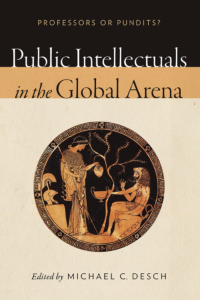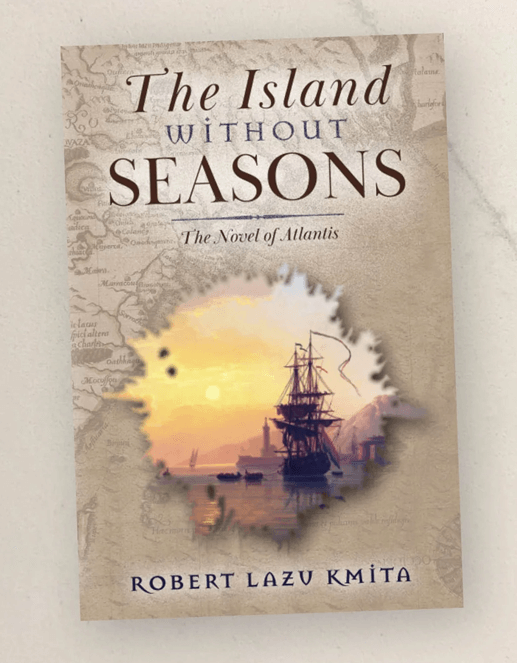Michael C. Desch’s Public Intellectuals in the Global Arena: Professors or Pundits?

Public Intellectuals in the Global Arena: Professors or Pundits? Michael C. Desch. Notre Dame, Indiana, University of Notre Dame Press, 2016.
The present volume on public intellectuals is based on a conference held at the university of Notre Dame in 2013 and includes good scholarly works. The volume begins by an introduction in which some of the basic questions on public intellectuals are raised: Do policymakers or the public really listen to public intellectuals? Is their effect beneficial? How often do intellectuals get things right when they engage in public policy? etc. The introduction is followed by three sections, one that deals with public intellectuals in a comparative context, another on the roles played by the practitioners of various vocations as public intellectuals, and a concluding section composed of reflections on public intellectualism.
The first section begins with Jeremi Suri’s analysis of the way in which American public intellectuals, such as George Kennan and Henry Kissinger, derived realistic insights about foreign policy from history, and how a shallow and self-referential interpretation of their historical insights led American policymakers after 9/11 to make foreign policy decisions stemming from what Suri calls “a combination of power obsessions and idealistic fetishism” (57).
Andrew J. Bacevich criticizes American public intellectuals Arthur Schlesinger, Reinhold Niebuhr and Dwight Macdonald for their role in the formation of the early Cold War consensus that viewed the Soviet Union in ideological and apocalyptic terms, thus foreclosing alternatives, and impoverishing debate and shackling the United States into what he sees as a “state-centered, militarized version of liberalism” (83).
Willy Lam looks into the reasons for China’s failure to adopt democratic norms and institutions despite the integration of the Chinese economy with the global marketplace. He explains it by the difficulty of democratically-inclined professors, writers, bloggers, artists and other public intellectuals to resist the Chinese Communist Party’s control over them, co-opt some of them, and exploit nationalism to weaken the appeal to universal liberal ideals. Lam also blames the weak support liberal intellectuals in China get from Western governments and institutions who are unwilling to jeopardize their relationship with Beijing by criticizing its horrendous human rights record.
Enrique Krauze is concerned with Latin American intellectuals whose scope and perspective encompasses the entire continent. He attributes their emergence to the Spanish-American War of 1898, when liberal writers such as José Martí were moved by an instinct of political solidarity with the defeated Spanish empire. He then discusses the split caused by the Cuban Revolution between its sympathizers and critics, and the rise of academic intellectuals as bearers of the torch.
Ahmad S. Moussalli shows how Arab intellectuals informed by Western civilization failed to absorb Western liberal values and simply yielded to its slogans, while others rejected those values altogether in the name of tradition. Moussalli criticizes the traditionalists for adhering, under the pretext of authenticity, to a collection of texts and languages beyond modern grasp but is also skeptical about liberal Arab intellectuals who derive their views from the margins of Western thought.
The second section includes articles by Patrick Baert who discusses Jean Paul Sartre and Bertrand Russell as philosophers who were successful in using their accomplishments within philosophy to legitimate their views on political issues that went beyond it; J. Bradford Delong who surveys the history of major economists who influenced the public square; Paul Horowitz who argues that the blogosphere has made it easier for intellectuals to write for the public and more attractive to speak to the present moment; Kenneth R. Miller who focuses on scientists who played a public role by advising government officials, serving as advocates for science, educating the public, etc. amidst science denial in the public square; and Gilles Andréani who provides several examples of French diplomats who made their voices heard in public debates.
The third section begins with Mark Lilla revisiting his acclaimed The Reckless Mind in which he proposed an affinity between modern thinkers and tyranny. That book was rooted in the cold War era in which two dominant ideological parties were engaged in an historical winner-take-all game and the intellectuals defending their respective parties felt excited and self-important. Looking back at the book from the present perspective, when the world hardly resembles anything the Cold Warrior might have expected, Lila laments the end of coherent, historically grounded ideologies that would make sense of the non-democratic world in which most people live today.
Michael Zuckert, on the other hand, does not miss the ideologues Lilla calls for and offers his own prescription for the public intellectual. Zuckert’s role model seems to be John Locke whose works, while informed by the discourse held within the community of enlightened scientists and philosophers he belonged to, were, however, also accessible to wider circles of educated persons such as the American revolutionary leaders.
Patrick J. Deneen claims that the role of the public intellectual as a person of extensive education, intelligence, learning and knowledge, who has the added ability of conveying those qualities to a broader non-specialized audience, can actually be found in undergraduate teaching at the university. At the same time he realizes that the decline observed in the teaching of the humanities in American universities diminishes that role.
Michael C. Desch brings up the example of Max Weber who insisted on the separation of facts and values and yet left an impact on politics. Desch calls upon the contemporary scholar to follow this example and fulfill what he sees as “our collective ethical obligation to the rest of society” (366).
In the concluding essay, Vittorio Hösle proposes a taxonomy of public intellectuals based on criteria such as their position as public servants or advisors, whether their knowledge is instrumental or value oriented, what their motivation is to engage in public affairs, whether they support or challenge the status quo, or what their impact on politics has been.
The above taxonomy demonstrates the problem with this volume, and similar ones, containing reflections on the (mostly failed) efforts by philosophers, economists, bloggers, scientists, or diplomats to gain public respect and political influence. To me, the question is not whether policymakers or the public listen to intellectuals but where they can be found when they are really needed, that is, when intellectual frameworks derived from the search for truth and justice remain the only barrier against the falsehoods guiding oppressive and corrupt political regimes. Hösle, like most contributors to this volume, is therefore wrong, in my opinion, when he dismisses Zarathustra, some of the prophets of the Old Testament, Jesus, Muhammad, Luther, and Calvin as public intellectuals because of their adherence to traditions that defied reason. Nathan the Prophet, for example, who stands up to a sinning King David in the name of truth and justice has given every public intellectual in history the aim to aspire to and a warning about the risks involved. As Hösle rightly concludes, our real task as intellectuals is thus not to construct taxonomies but to search our own soul.




